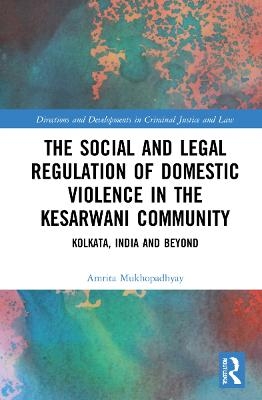
The Social and Legal Regulation of Domestic Violence in The Kesarwani Community
Kolkata, India and Beyond
Seiten
2022
Routledge (Verlag)
978-1-032-25434-0 (ISBN)
Routledge (Verlag)
978-1-032-25434-0 (ISBN)
This book examines the social and legal regulation of domestic violence within Kesarwani business community following the enactment of the Protection of Women from Domestic Violence Act 2005.
This book examines the social and legal regulation of domestic violence (DV) within the Kesarwani business community following the enactment of the Protection of Women from Domestic Violence Act 2005. It analyses the existence of the formal law in Kolkata and the relevance of the law in the familial lives of the Kesarwani community.
The book offers a new conceptualisation of examining the relationship between formal law and social life. It provides a deep insight into how living with violence becomes a way of living and how the disposition to familial violence exists with social advantage and privilege. Explaining the functioning of the formal DV framework in non-legal terms as it exists on the paper, the book shows the ways in which this one law sought to democratise the family unit and overhaul the legal process in favour of DV victims in India. Most of all it hopes to show through the Kolkata study that caste and class, social structures that regulate and define social life globally, must remain critical to discussions of the social and legal regulation of DV in Kolkata, India or anywhere in the world. The book uses ethnography as a research methodology and traverses different locations in the Kesarwani community, and outside the community in Kolkata, to examine the relevance of the formal law in the lives of Kesarwani women. While the study is in India (and in a non-western context), the theme of the study – the social and legal regulation - remains relevant to contemporary debates on the efficacy of formal law in addressing coercive control in the western world. Notably, the book makes the formal domestic violence law legible for non-legal professionals by explaining the formal legal framework of domestic violence envisaged in the PWDVA.
This book will be of interest to students and scholars of law, criminal justice, sociology, anthropology, women’s studies, and political science. It will also appeal to social service providers and practitioners working in the area of domestic violence, legal regulation, social control of women, gender, caste, class and family business.
This book examines the social and legal regulation of domestic violence (DV) within the Kesarwani business community following the enactment of the Protection of Women from Domestic Violence Act 2005. It analyses the existence of the formal law in Kolkata and the relevance of the law in the familial lives of the Kesarwani community.
The book offers a new conceptualisation of examining the relationship between formal law and social life. It provides a deep insight into how living with violence becomes a way of living and how the disposition to familial violence exists with social advantage and privilege. Explaining the functioning of the formal DV framework in non-legal terms as it exists on the paper, the book shows the ways in which this one law sought to democratise the family unit and overhaul the legal process in favour of DV victims in India. Most of all it hopes to show through the Kolkata study that caste and class, social structures that regulate and define social life globally, must remain critical to discussions of the social and legal regulation of DV in Kolkata, India or anywhere in the world. The book uses ethnography as a research methodology and traverses different locations in the Kesarwani community, and outside the community in Kolkata, to examine the relevance of the formal law in the lives of Kesarwani women. While the study is in India (and in a non-western context), the theme of the study – the social and legal regulation - remains relevant to contemporary debates on the efficacy of formal law in addressing coercive control in the western world. Notably, the book makes the formal domestic violence law legible for non-legal professionals by explaining the formal legal framework of domestic violence envisaged in the PWDVA.
This book will be of interest to students and scholars of law, criminal justice, sociology, anthropology, women’s studies, and political science. It will also appeal to social service providers and practitioners working in the area of domestic violence, legal regulation, social control of women, gender, caste, class and family business.
Amrita Mukhopadhyay received her PhD from the School of Social Sciences at Western Sydney University in June 2021. She currently works in a professional role at the University of New South Wales, Sydney, Australia.
Chapter 1: Introduction
Chapter 2: Gendered Violence in India
Chapter 3: The Protection of Women from Domestic Violence Act 2005
Chapter 4: Symbolic Violence and Kesarwani Women in Kolkata
Chapter 5: Physical Violence within the Kesarwani Community
Chapter 6: The Domestic Violence Framework in Kolkata
Chapter 7: Conclusion
| Erscheinungsdatum | 17.08.2022 |
|---|---|
| Reihe/Serie | Directions and Developments in Criminal Justice and Law |
| Zusatzinfo | 5 Tables, black and white; 5 Line drawings, black and white; 20 Halftones, black and white; 25 Illustrations, black and white |
| Verlagsort | London |
| Sprache | englisch |
| Maße | 156 x 234 mm |
| Gewicht | 453 g |
| Themenwelt | Naturwissenschaften ► Geowissenschaften ► Geografie / Kartografie |
| Sozialwissenschaften ► Soziologie ► Gender Studies | |
| Sozialwissenschaften ► Soziologie ► Spezielle Soziologien | |
| ISBN-10 | 1-032-25434-3 / 1032254343 |
| ISBN-13 | 978-1-032-25434-0 / 9781032254340 |
| Zustand | Neuware |
| Haben Sie eine Frage zum Produkt? |
Mehr entdecken
aus dem Bereich
aus dem Bereich
über eine faszinierende Welt zwischen Wasser und Land und warum sie …
Buch | Hardcover (2023)
dtv (Verlag)
24,00 €
Buch | Hardcover (2024)
Schweizerbart'sche, E. (Verlag)
24,00 €
Eine Einführung in die spezielle Mineralogie, Petrologie und …
Buch | Hardcover (2022)
Springer Spektrum (Verlag)
59,99 €


